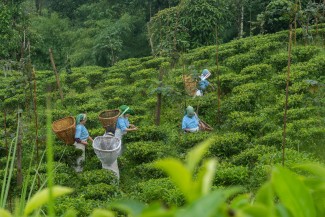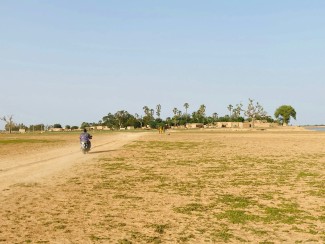Trainings in beekeeping and the provision of hives aims to create additional income sources for agriculturalists
Beekeeping doesn’t come naturally, really.
To get even a kilo of honey involves obtaining a hive and procuring a colony with the all-important queen. And then there’s the knowing how to care for bees so they don’t buzz away for good, and having all the necessary plants nearby. Then of course there’s harvesting, and, if you want to sell that honey, getting it into containers and to the right market.
But with those tools, skills and knowhow in place, honey has a lot to offer, which is why a partnership in Ethiopia between the International Centre of Insect Physiology and Ecology (icipe) and the Enhanced Integrated Framework (EIF) is working with 8 districts and 2,650 people throughout the country to help spur honey’s development.
“The options for rural people’s incomes are limited, and honey has so much potential and ability to support jobless youth,” said icipe’s Abebe Jenberie Wubie, PhD, who is managing the work and trainings.
Ethiopia produces the most honey and beeswax of any African country, but the majority is used locally for the honey wine known as tej, as well as for candles used in church services. What if the country’s fresh honey was also traded?
Making niche
One of the cornerstones of EIF’s work with the 47 least developed countries, of which Ethiopia is one, is the development of Diagnostic Trade Integration Studies (DTIS), which delve into the trade conditions in a country and offer advice for action. Ethiopia’s most recent DTIS was completed in 2016, and listed honey in its export potential section as a product with a competitive advantage over other countries, noting honey is “more relevant for niche or specialized market development.”
And, global demand for honey is increasing.
“Ethiopian honey is very high in quality but meeting the international market standards is very important, and in terms of building the capacity this is important,” said Mesgenu Arga Moach, State Minister of Ethiopia’s Ministry of Trade and Industry.
To develop a niche product such as honey for export, certifications and quality standards adherence are key elements of the process. The DTIS notes an additional option of getting what is known in trade circles as a “geographical indication”, which marks an item as specific to a locale, and having qualities or a reputation due to that place. The geographical indication, for example France’s Champagne or Switzerland’s Gruyère, helps to generate higher prices and make items more competitive, adding value to the product.
Laws of attraction
Ethiopia’s honey has the quality, but there are a number of steps to go before it’s certified and branded, i.e. recognized.
The first step is playing out on a verdant plain in Ankesha near Lake Tana. Thirty-six bright yellow wooden hives sit under a tin-roofed, mud-walled structure. The hives are tended by 18 Boya locals who are brand new to apiculture. They were trained in managing honeybee colonies, what species of plants bees prefer for foraging, pollination techniques and what to do when hives aren’t active.
Now that the thousands of trainees have started harvesting, a new set of trainings related to markets and post-harvest handling, depending on a country’s standards, is ongoing with over 323 beekeepers in East Gojjam, West Gojjam and Awi in the Amhara region. Using honey processing equipment, standards principles and honey storage is being covered.
“Most of the topics were practical to equip the beekeeping youth. The majority of youth beekeeping enterprises have already started harvesting honey and beeswax and we are preparing a regional honey festival in line with the continental ApiExpo-Africa event to be held next month to introduce the products of the beneficiary beekeepers to consumers and processors in order to open up market linkages,” said Wubie.
Busy
Agumas Asema, one of the Boya beekeepers who manages two hives, said he is hoping to make extra money following his first honey harvest.
“I don’t own any land, I don’t have a major occupation,” he said. “I make money by growing on other people’s land and sharing the proceeds.”
Hence the connection to markets will be key. And as with any new endeavor, there are always challenges. Asema noted that his new group of fellow beekeepers can get advice and information if they need it from a nearby agriculture extension officer and trainers.
One major challenge so far is colony absconding, when bees abandon their hives altogether.
Wubie said, “For this we have to continue training with the hives so the new beekeepers get used to the new technology. As to colony management, we need to keep training on dearth period feeding and sustainable bee forage development in and around apiaries.”
Resolving these issues locally is getting the country’s honey on the road to markets globally, and while certain trainings have been put on hold because of COVID, the pandemic has had an odd impact on honey.
“Though COVID-19 is still a challenge, many in the beekeeping community worldwide are saying that they are getting even better prices from hive products due to the pandemic. In our locality, it is true that larger volumes of honey have been sold to consumers with better prices, as people are publicly advising each other to use honey as medicine to fight COVID,” Wubie said.
“At this point, I myself with my family have consumed 36 kg of honey since the first COVID case was detected in Ethiopia in March 2020,” he added.
Originally published by the International Trade Centre (ITC) International Trade Forum Magazine on 9 December 2020
If you would like to reuse any material published here, please let us know by sending an email to EIF Communications: eifcommunications@wto.org.



